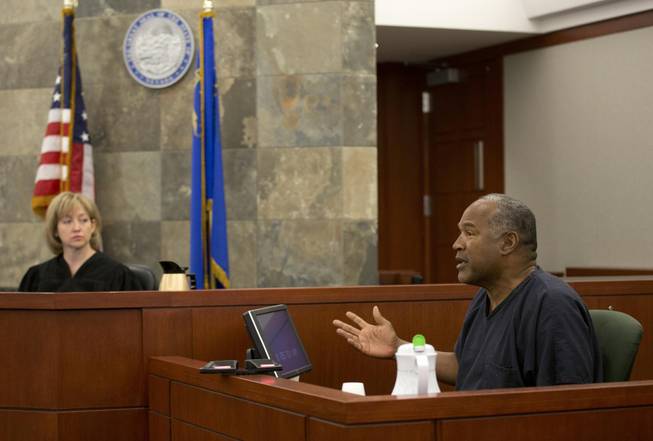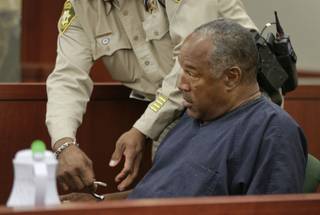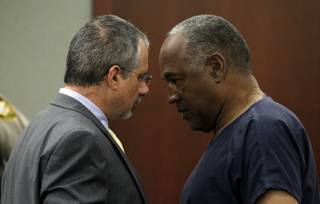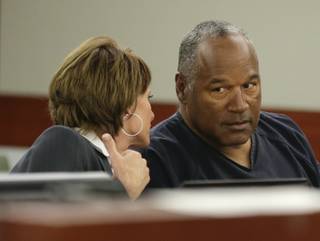
Julie Jacobson / AP
O.J. Simpson, right, testifies as Judge Linda Marie Bell listens during an evidentiary hearing in Clark County District Court, Wednesday, May 15, 2013 in Las Vegas.
Published Wednesday, May 15, 2013 | 9:28 a.m.
Updated Wednesday, May 15, 2013 | 4:17 p.m.
His leg shackles rattling as he shuffled to the witness stand, a grayer, bulkier O.J. Simpson made his case for a new trial on armed robbery charges Wednesday, saying he was relying on the advice of his trusted attorney when he tried to reclaim mementos from his football glory days.
The former NFL running back also said his trial attorney never told him about possible plea bargains with much less prison time. And he said his attorney assured him he could not be convicted.
After more than four years in prison, Simpson seized the opportunity to recount how he and some friends confronted two sports memorabilia dealers in a Las Vegas hotel room in 2007, and how he believed he had the right to take back what he claimed had been stolen from him, including photos and footballs.
"It was my stuff. I followed what I thought was the law. My lawyer told me I couldn't break into a guy's room. I didn't break into anybody's room. I didn't try to muscle the guys. The guys had my stuff, even though they claimed they didn't steal it," the 65-year-old former NFL star and actor said.
Simpson did not testify when he was tried and convicted of armed robbery and kidnapping in 2008. He was sentenced to nine to 33 years in prison.
His fall from long-ago fame and fortune was demonstrated as he made his way to the stand with shackles around his ankles for a hearing on his claim that he was poorly represented by his attorney during the trial.
As his new lawyer, Patricia Palm, questioned him, he provided details that seemed to encompass every minute of a weekend that began with plans for a friend's wedding and ended with him under arrest.
He said he knew the memorabilia dealers, had no fear of them and certainly didn't need guns. "There was no talk of guns at all," he said. Simpson declared he never even saw guns during the confrontation.
During the trial, two former co-defendants who testified for the prosecution said they had guns.
Simpson's bid for freedom hinges on showing his lawyer badly represented him. He mentioned the lawyer, Yale Galanter, from the outset.
"He was my guy," he said of his long friendship and professional relationship with Galanter.
But he blamed Galanter's advice for getting him in trouble. He said Galanter told him he was within his rights to take back his possessions as long as there was no violence or trespassing.
Another Simpson attorney from the 2008 trial has said it was Galanter who pushed on Simpson a decision not to testify.
While the trial prosecutor testified earlier that there were preliminary discussions with Galanter about a plea bargain, Simpson testified he was never told a bargain was under consideration and that he did not remember any offer being given to him at trial.
Asked by Palm if he knew he could have gotten as little as 30 months in prison if he pleaded guilty to robbery, Simpson said no, and that he would have considered it if he had known.
Simpson also said Galanter led him to believe he could not be convicted on the charges.
"If you understood you could be convicted on the state's evidence, would you have testified?" Palm asked.
Simpson said yes.
Dressed in a drab blue prison uniform, Simpson spoke clearly as he recounted events leading to the hotel room where the dealers had the memorabilia. His voice cracked a bit as he recounted recognizing items on the bed, including framed photos that used to hang on the wall of his Los Angeles home.
"Look at this stuff. Some of the stuff I didn't really realize was gone. These were things I hadn't seen in 10 years," he said. "You know, you get a little emotional about it."
There is no jury in the hearing and Simpson's fate will be determined by District Judge Linda Marie Bell.
While Simpson's previous court cases, including his 1995 acquittal in the killings of his ex-wife and her friend Ron Goldman, were media events, there were empty seats in the courtroom for the first two days of the hearing.
But on Wednesday the courtroom was full, with Simpson family members and friends in the second row. A marshal turned people away, sending them to an overflow room where video was streamed live.
Still, the scene was much tamer than in the past.
"This is less hoopla than I expected. It's real toned down," said Wyatt Skaggs, a retired defense attorney visiting from Laramie, Wyo.




Join the Discussion:
Check this out for a full explanation of our conversion to the LiveFyre commenting system and instructions on how to sign up for an account.
Full comments policy